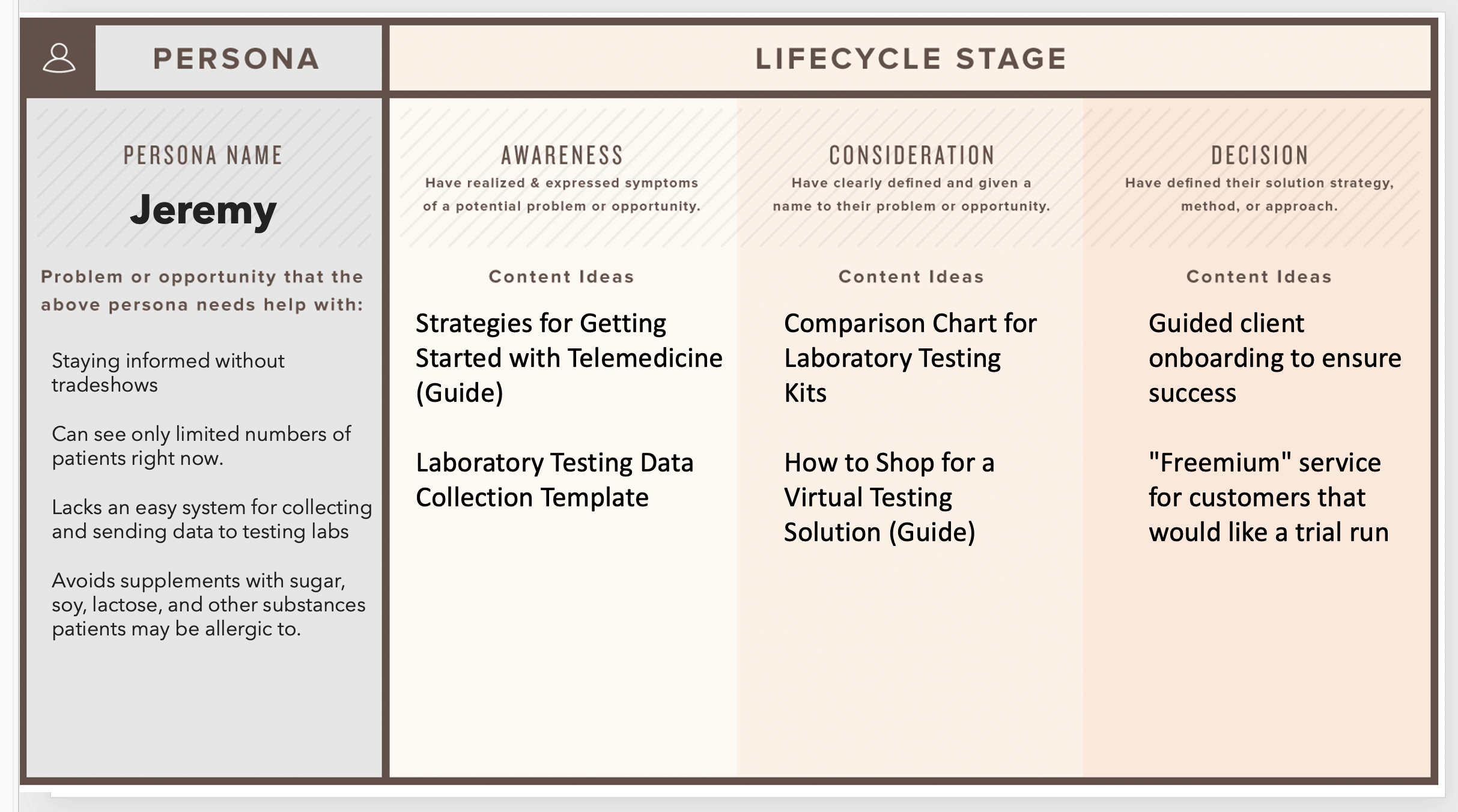As the medical community transitions to the next phase of adjustments brought on by the coronavirus, healthcare marketers will have a new set of challenges to overcome.
Business priorities and processes have changed so much in the last few months it’s hard to even wrap our heads around it, much less predict what is next.
At this stage, many marketers are wisely reassessing not just customer needs, but also how the buying process has changed. There has never been a better time to go back to the foundation of your marketing strategy, map a new path for guiding people on the buyer’s journey, and find creative ways to strengthen your brand’s relationship with them along the way.
Rediscover Your Buyer Personas
When was the last time you interviewed buyers about their decision-making process?
It’s easy to assume we all understand what matters to buyers as they compare different options and arrive at a solution, but there are always blind spots. Ask your salespeople they lose deals and nine times out of ten they say “cost.” Don’t believe them.
Would it surprise you to hear that, in all the buyer persona research we’ve done for our clients, cost almost never comes up as the top reason why a company chose one option over another? Price is a consideration in every purchase, but in a B2B context, buyers have priorities that extend far beyond finding a cheap solution.
The best way to understand how medical professionals are comparing solutions like yours is by interviewing people who have been through this process within the last 12 months. These interviews should be unscripted, and probe for the “5 Rings of Insight” popularized by the Buyer Persona Institute.
After recording at least ten interviews with buyers (try to find ones that have never heard of your brand), you should be able to identify specific buying insights using quotes from the discussion. As you work through them, patterns will emerge that clarify what the real buyer’s journey is.
Folks, there has never been a better time to get to know your buyers than right now.
Our lives have changed overnight, and “business as usual” is long gone. If you think adding a few clichés to your marketing message are going to help (if I see another email that starts with “In these uncertain times” I’m going to scream!), you are mistaken.
Successful marketing today demands empathy that comes from real understanding. If you’d like a few hints, here are three things on the minds of buyers right now as they consider new solutions:
- Flexibility – What sort of commitment am I willing to make when cash reserves are strained and the long-term economic picture is hazy?
- Availability – How will current supply-chain realities impact access to your products, services, and support?
- Shipping – How long will I have to wait to get supplements, lab test results, medical devices, and other products?
Mapping Content to the Buyer’s Journey
Armed with direct insights about the buying process, you now have the means to “map” the buyer’s journey across the Awareness, Consideration, and Decision stages.
It’s important to plan the right content offers to educate your target buyer throughout each stage, helping them find the solution that’s most appropriate for them while you qualify them as a good fit for your company.
Here is a fictional example of what content mapping might look like for a food allergy testing company that serves medical professionals. Let’s say the company has completed a series of interviews with their buyers who happen to be practitioners, and have some useful insights to plan a content strategy with.
Let’s call the persona Jeremy.
Jeremy is an experienced naturopathic physician whose practice has been hit hard by the shelter-in-place order. He has no practical experience with telemedicine, and lacks systems for gathering lab testing samples from patients.
If you are trying to help Jeremy transition to part-time virtual care and collect samples remotely, you would create resources that would help him through the awareness, consideration, and decision making process.

Awareness stage:
Jeremy recognizes he has a challenge with collecting samples from patients and sending them to the lab for testing since all of his patients are in lockdown.
Content offers:
- Strategies for Getting Started with Telemedicine (Guide)
- Laboratory Testing Data Collection Template
Consideration stage:
Jeremy decides he needs a remote testing solution, and is ready to compare options.
Content offers:
- Comparison Chart for Laboratory Testing Kits
- How to Shop for a Virtual Testing Solution (Guide)
Decision stage:
Jeremy is almost ready to make a decision. He has the choice narrowed down to two options.
Offers:
- Guided client onboarding to ensure success
- “Freemium” service for customers that would like a trial run
“Marketers have to do more than educate and build trust with an audience. They need to make their buyers into heroes. It means setting aside your hidden agendas when it comes to…sales, and just helping your buyers look good to the people that matter to them.”
Make Your Buyers Heroes.
Regardless of whether your buyers work with patients, finance, regulatory compliance, manufacturing, or another area – you need to surprise them with your content.
This does not mean every blog or video features some incredibly new, mind-blowing idea. It should present new, useful, and interesting information to them. This was the standard for “good content” before the pandemic.
Now, marketers need to do more than educate and build trust with an audience. They need to make their buyers into heroes.
It means setting aside your hidden agendas when it comes to marketing and sales, and just helping your buyers look good to the people that matter to them.
It means helping your audience in ways that may not necessarily benefit you. In fact, these gestures are often most impactful when there is no direct boost to your brand. It shows them you care, that you understand their problems better than anyone else and are willing to work behind the scenes to lift them up.
Here is an example of how we did this for one client that sells dietary supplements to naturopathic physicians and chiropractors.
When the spread of the coronavirus became a crisis in mid-March, we immediately shifted our focus from lead generation to relationship building. We knew the practitioner community was in chaos, and patients were not getting critical information about how to manage their health during the lockdown. Instead, they were getting a steady diet of social media memes about toilet paper hoarding and hand washing.
So, we created a series of “white label” emails, explaining the steps to proper immune system support – what to buy at the grocery store, how to reduce stress, get better sleep, and stay active – and we sent them to practitioners, encouraging them to pass along the information to their patients.
The response from the medical community was huge:

None of these white-label emails mentioned our client or their products, even though immune support supplements are some of their biggest sellers. We did this to help doctors get some critical information out to people who depend on them, and do it in a way that required almost no effort on their part.
Is this likely to translate into sales? I think so. If no other supplement company took the time to support their customers in a different, memorable way, why wouldn’t they think of our client first?
Not all marketing needs show an immediate return. You can make a deposit into the future equity of a relationship that’s worth far more in the long term, and you can do it without sacrificing your current campaigns that bring in immediate ROI.
In many ways, the pandemic is simply accelerating trends that have been happening in marketing and sales for some time. Understanding how your buyers make decisions (and how that process is changing) is really the first step, followed by mapping out content and conversion paths that guide them on that journey.
But most importantly, you have to earn a seat at their table by making them experts to their own patients and customers. If you can do that, you’ll know you are providing a service that has real value.
{{cta(‘0ac491b1-b36c-4107-b043-3e54bbb4bcba’)}}

